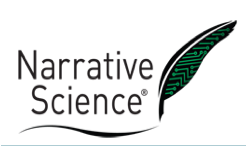The name ‘Narrative Science’ doesn’t mean much to most people. In a few years it just might. They are a US start-up who’s software is being used to generate reports on various topics, including sport and market analysis. Narrative Science essentially collates masses of data on the desired area of interest, and picks out important information, organising it in a relatively simple article or report.
Forbes has published economic reports using the software, while college sports site, Big Ten News, generates game reports in the same way. While the results won’t be winning a Pulitzer Prize any time soon, they are undoubtedly better than most would expect. At present the technology is useful only in these areas due to the focus on statistics and trends. Nonetheless, it trumps similar projects such as marketbrief and stats monkey, which can collect data in a similar way, but cannot express it in article format.
Should online writers feel threatened by this new technology? Yes and no. What makes Narrative Science so appealing to data-reliant industries is its cost. Construction industry publisher, Hanely Wood, pays Narrative Science a little under $10 for each 500-word article. It is entirely likely that as more companies use this technology, the price will lower even further. It can be seen that at present, Narrative Science is providing a service to businesses that would not be able to generate such content in a cost-effective method otherwise, although Forbes has shown that technology could make some of its writers and analysts redundant in the future.
However, it seems only a matter of time before Narrative Science is improved to enter other markets. Their website claims that their technology ‘frees up existing editorial resources to focus on stories that either require deeper investigation or create stories that would not otherwise be written’.
While examples of the latter point are clear, it is less clear how much of an impact technology like this will have on staff numbers in media outlets in the future.
Narrative Science isn’t going to destroy online journalism as we know it, but as publications scramble to cut costs as they are dragged into the digital platform, writing technology could be the saving grace of those in dire financial need.
It is more likely that it will continue to grow and fill a niche for businesses and specific publications. The fact remains that most areas of journalism require an understanding of a topic more subtle and nuanced than any program could have, not to mention writing style and flair.
Nevertheless, journalists involved in sports and market write-ups may have a reason to worry if Narrative Science makes an impact online.
Tim Viney is a Master of Global Communications student at La Trobe University.









